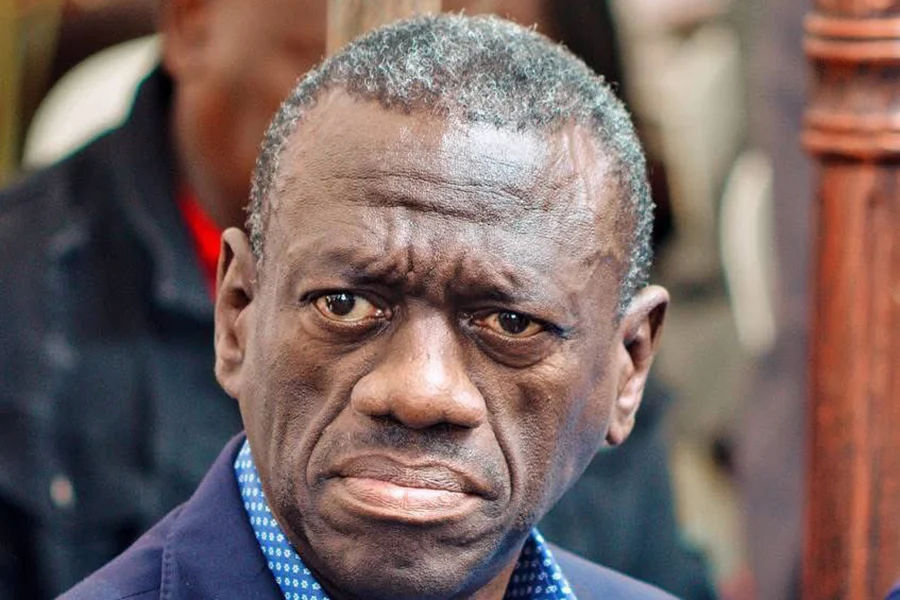Besigye Denied Mandatory Bail as Magistrate Refers Case to High Court

Nakawa Chief Magistrate Christine Nantege has declined to grant mandatory bail to opposition leader Dr Kizza Besigye and his co-accused Ronald Lutale, referring the matter to the High Court and sparking sharp protests from the defence team.
Besigye and Lutale, who have now spent more than six months on remand, appeared before the Nakawa Chief Magistrates Court on Thursday seeking release under Article 23(6)(c) of the Constitution.
The clause provides that suspects held for over 180 days without committal for trial are entitled to mandatory bail.
“This marks 196 days since Dr Besigye and Mr Lutale were first remanded,” said lawyer David Mpanga.
“Their detention exceeds the constitutional threshold. The right to mandatory bail is ripe and must be honoured.”
The charges against the two stem from a case first filed before the General Court Martial on 28 November 2024 under file number UPDF GCM/040/2024.
Following a Supreme Court order, the case was transferred to the civilian justice system, and the duo were charged afresh before the Nakawa court on 21 February 2025.
The prosecution, led by State Attorney Richard Birivumbuka, argued that the 180-day clock should be counted from the date of the new charges, not the original remand before the military court.
“They have only been in remand for three months and eight days under the charges known to this court,” Birivumbuka submitted.
“The previous military proceedings have no bearing on this matter.”
But defence lawyers called that interpretation a constitutional evasion tactic.
“Liberty cannot be reset by transferring the file or rephrasing the charges,” said Eron Kiiza.
“The Constitution protects against prolonged detention, not only under one courtroom.”
Lord Mayor Erias Lukwago, also on the defence team, emphasised that the state had not committed the accused to the High Court within 180 days, as required by law.
“This court cannot entertain amendments to the charge sheet without addressing the accused’s liberty as a matter of priority,” he said.
“The charges can be amended, but liberty cannot be postponed.”
Despite these arguments, Chief Magistrate Nantege ruled that the Nakawa court had no jurisdiction to address the bail application on its merits.
“This court lacks jurisdiction to entertain constitutional interpretation or consider time spent in military custody,” she said, advising the applicants to petition the High Court for a remedy.
Her decision provoked immediate objections. Mpanga insisted the magistrate had the duty to refer the application to the High Court under Guideline 11.03 of the Judiciary Bail Guidelines.
“This court has avoided its constitutional responsibility by neither hearing the matter nor transferring it,” he said.
Karua, another lawyer for the accused, pressed the question: “When does the period of remand start?” She argued that treating civilian and military detention as unrelated undermines the Constitution’s protection of liberty.
Earlier in the session, State Attorney Birivumbuka accused the defence of withholding affidavits, requesting an hour’s adjournment.
Karua dismissed the claim, saying the affidavit in question bore only a date. Magistrate Nantege granted a 10-minute break instead.
Upon resumption, Birivumbuka claimed the application was filed in bad faith.
“They are tainted with dirt in this application,” he said.
“Now that we are ready to commit them, this mandatory bail claim is meant to frustrate trial.”
But the defence dismissed that logic as unconstitutional.
“The readiness of the state to commit suspects cannot override the right to bail,” Lukwago said.
“That is not how justice works.”
Besigye, a four-time presidential candidate, and Lutale have been in continuous state custody since November 2024.
Rights advocates and political observers say the case now poses a serious test to judicial independence and constitutional compliance.
The defence team has confirmed it will now seek a revision from the High Court to challenge Magistrate Nantege’s ruling and enforce their clients’ right to liberty.
As the two return to Luzira Prison without trial or bail, their lawyers insist the law is clear—and must be followed.



0 Comments